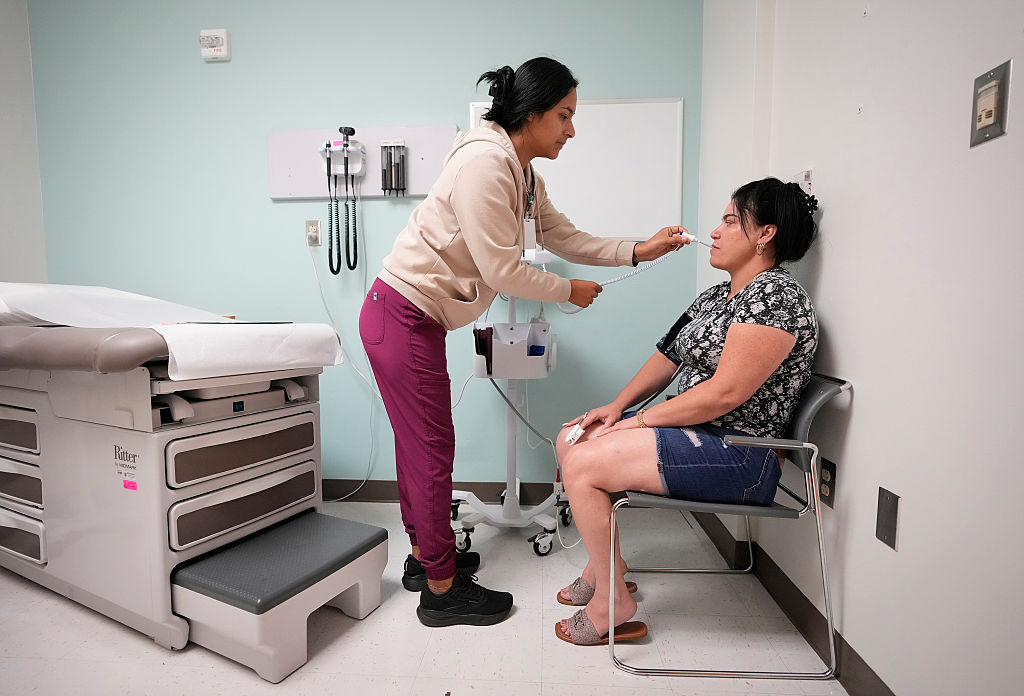Health Care Consolidation Is Leading to Ever-Higher Prices
Health insurance premiums keep rising, fueled by decades of lax oversight of health care consolidation that has given hospitals and health insurers enormous market power. That power is letting insurers keep raising prices and increasing their profits.

Hospitals’ and clinics’ ability to influence health care prices stems from decades of industry consolidation, which began accelerating in the 1990s. (Jay Janner / Austin American-Statesman via Getty Images)
Millions of Americans are likely experiencing sticker shock as they learn that their monthly health insurance bills are set to skyrocket next year. Much of the blame has focused on the likely expiration of enhanced premium tax credits, which will drive up rates for Affordable Care Act Marketplace plans.
But this development isn’t the only culprit for our current health insurance crisis. After all, those with employer-sponsored coverage are also facing major insurance price hikes. In truth, experts say this moment has been decades in the making, fueled by lax oversight of health care consolidation that has given hospitals and health insurers enormous market power — and the freedom to keep raising prices.
“It’s definitely not debated that the reason why health care in this country costs more is because we let pharmaceutical companies and hospitals set the prices that they want to set,” said Claire Heyison, a senior policy analyst at the Center on Budget and Policy Priorities, a nonpartisan institute that analyzes federal and state budget policies.
Insurers echo this point: in its government filing detailing their proposed rate changes for 2026, Regence BlueCross Blue Shield of Oregon noted that “increasing cost of medical care is a significant driver of the rate change.”
Left unmentioned in such claims is the insurance sector’s rising profits and its own role in soaring premiums.
“Once these systems have consolidated, it’s virtually impossible to unscramble the egg,” said Robert Murray, president of Global Health Payment, LLC, a management consulting firm that specializes in reimbursement systems for health care providers.
The Power of Consolidation
Hospitals’ and clinics’ ability to influence health care prices stems from decades of industry consolidation, which began accelerating in the 1990s as providers sought leverage in price negotiations amid a wave of health insurer mergers. From 1998 to 2023, there were more than two thousand hospital and health system mergers, and today, nearly half of all physicians are employed by or affiliated with larger hospital systems — up from less than 30 percent in 2012.
Such consolidation has reduced competition and given a handful of companies unprecedented market power. The for-profit company HCA Healthcare, the largest health system in the country based on the number of hospital beds, brought in an operating revenue of $65 billion in 2023 — larger than that of Netflix, Uber, or Starbucks. The nonprofit AdventHealth, the smallest of the top ten health systems, still generated more operating revenue than Zoom and Lyft combined.
This market control allows health care companies to demand insurance companies pay them higher prices for their services, since there are few alternative providers. A January 2025 study found that hospital prices are higher in more concentrated markets in large part because “insurers’ bargaining leverage is lessened at greater levels of hospital consolidation.”
As of 2023, health care spending in the United States reached nearly $5 trillion, rising much faster than in previous years. Half of that spending went to hospital care and physician and clinical services delivered outside of hospitals. Retail prescription drug spending, meanwhile, climbed more than 11 percent in 2023 to nearly $450 billion.
Experts say federal merger guidelines aren’t strong enough to protect market competition and consumer welfare. For example, automatic government reviews of these mergers are only triggered if the deals are valued at more than $92 million, which excludes most health care consolidations.
Consequently, “consolidation is occurring mostly unchecked across the health care sector, leading to higher prices and fewer choices,” according to the Commonwealth Fund, which works to promote an equitable health care system.
Patients end up shouldering the resulting price hikes. Research has shown that rising hospital costs are passed through, nearly dollar for dollar, into employee health insurance premiums.
Now with the looming expiration of enhanced premium tax credits — which lowered health insurance premiums for 92 percent of Affordable Care Act policyholders last year — experts say this convergence of factors has created a perfect storm for soaring rates.